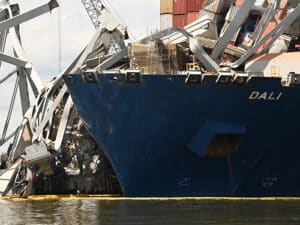
ONE sees low sulfur fuel as best option for sulfur cap compliance
Written by Nick Blenkey
SEPTEMBER 6, 2018 — The world’s sixth largest containership operator, Ocean Network Express (ONE), says it has identified three major options for complying with IMO’s 0.5% global sulfur cap on marine fuels and it has identifed low-sulfur compliant hybrid oil as one of the most realistic and cost-efficient solutions to enable it to be compliant by January 1, 2020, when the sulfur cap comes into effect. The company says it is in discussion with bunker suppliers on specifications.
ONE, which was established on July 7, 2017 by the integration of “K” Line, MOL and NYK, says that there are several existing ONE vessels that can be installed with scrubber systems, but notes that due to the large size of the equipment, cargo hold space must be sacrificed for scrubber installation. Additionally, vessels must be docked for retrofitting resulting in their being out service, with installation typically requiring more than one month to complete.
“As building of a new vessel with scrubber may take two to three years upon order confirmation, this approach will not be in time for ONE to be compliant by January 2020,” says the company, adding that “however, we will consider this approach for possible next phase. ONE is also evaluating to charter vessels with scrubber system to expand the number of compliant vessels in the fleet.”
Although LNG fueling is another option for compliance, vessels must be specifically equipped with an LNG-capable engine. Similarly to building of new vessel with scrubber, it takes two to three years to build a new LNG fueled engine ship, additionally, says the company, “services where ONE can deploy LNG powered vessel are also limited as there are constraints on availability of LNG bunkering facility. Although our LNG powered vessel deployment plan is not concrete at this moment, evaluation is underway where development of LNG bunkering environment is being further analyzed.”
Looking at the operational impact of the cap, ONE says that low sulfur gas oil (LSGO) may be one of the most popular compliant fuels, widely available especially by 2020. The current market difference of high sulfur fuel oil (HSFO) and LSGO is approximately $150-200 per metric ton. This gap is expected to increase after Jan 1, 2020 due to LSGO demand and this will certainly impact operational cost.
Although the regulation takes effect only from January 1, 2020, ONE says it will start complying with the regulation before the effective date kicks in as it takes several months to transit from non-compliant fuel.





Leave a Reply
You must be logged in to post a comment.